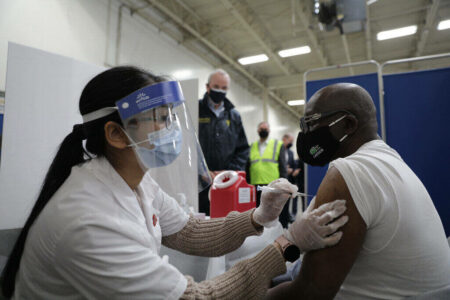August is National Immunization Awareness Month (NIAM) and there are a few days left to observe it. Of course, it does not have to be NIAM to get up-to-date on vaccines. Scientists work hard to develop vaccines to help keep people safe from diseases, viruses, and bacterial infections.
Vaccinations work by stimulating the body’s immune system to build up resistance to certain illnesses. Some contain inactive or weakened antigens to trigger an immune response within the body. Even though the vaccine may contain a weakened version of the infections they’re aimed to help prevent, they do not cause the disease in the person receiving the vaccine. Newer ones contain the layout for producing antigens rather than the actual antigens.
Vaccines are important because of the protection they provide the individuals who receive them and those around them who have weakened immune systems or are unable to have them due to allergies.

Robert M. Califf, M.D., Commissioner of Food and Drugs, stated that he knows “all too well how important vaccinations are throughout life, helping people of all ages live longer, healthier lives.” He added that in today’s digital age, it is difficult to get the right information about immunization.
The World Health Organization (WHO) estimates that 3.5 to 5 million death are prevented because of immunizations. The agency believes that tetanus, influenza, pertussis, measles, and diphtheria vaccines have kept tens of millions of people alive today.
The U.S. Food and Drug Administration (FDA) plays a key role in helping people stay healthy by evaluating vaccines for effectiveness and safety before they are made public. Vaccines are run through a rigorous evaluation of laboratory and clinical data to ensure they are safe, effective, and manufactured in good quality. The FDA’s Center for Biologics Evaluation and Research (CBER) are the ones responsible for regulating vaccines.
For example, CBER has been integral in overseeing the development of COVID-19 vaccines. They work with the manufacturers in order to get the injections out to the public while sticking to the safety and effectiveness criteria set by the FDA.
The agency only authorizes or approves a vaccine for emergency purposes if it meets the FDA’s standards for manufacturing quality, effectiveness, and safety.
The best way for people to help protect themselves from severe illness and hospitalization from COVID-19 is to be up to date on their vaccine. As a matter of fact, it is advisable to stay current on COVID-19, tetanus, flu, and other helpful vaccination. Vaccines help the body prepare and fight off illnesses. Staying up to date with routine vaccines can help people from hospitalization, severe illnesses, and possibly dying.
People should confer with physicians and other experts about the different vaccines about any concerns they may have about a vaccine. Other experts who can be consulted would be a person’s local health authority, health care professionals, and the Center for Disease Control and Prevention (CDC).
Via the FDA’s website, Califf stated, “The constant stream of information, opinion and, too often, disinformation, has eroded trust in societal institutions, including the FDA – and, regrettably, in the science upon which our decisions are based. This is causing harm to patients and consumers. It greatly concerns me that people are choosing not to receive the COVID-19 vaccines and are falling behind on routine vaccinations.”
Vaccines have prevented countless cases of disease and disability and have saved millions of lives. We are so fortunate that today, because of safe and effective vaccines, few people experience the devastating effects of measles, pertussis and other serious illnesses.
It is important to stay up to date on vaccines — and to ensure one knows the real facts — not just for the individual but for their families and community members who are susceptible to illness. It’s never too late to get up to date.
Written by Sheena Robertson
Sources:
FDA: FDA Recognizes National Immunization Awareness Month
CDC: National Immunization Awareness Month
WHO: How do vaccines work?
Top and Featured Image Courtesy of Matt Allworth‘s Flickr Page – Creative Commons License
Inset Image by Edwin J. Torres/ NJ Governor’s Office Courtesy of Phil Murphy‘s Flickr Page – Creative Commons License









